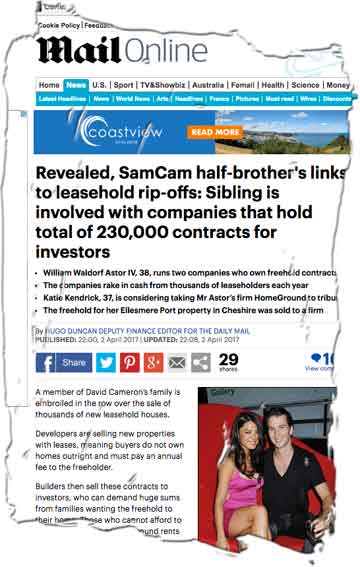
 Louie Burns, of Leasehold Solutions, here gives his assessment of the leasehold houses scandal and advice on what you can do about it.
Louie Burns, of Leasehold Solutions, here gives his assessment of the leasehold houses scandal and advice on what you can do about it.
LKP unhesitatingly recommends that leasehold house owners contact Louie Burns, who has a proven track record of working with leaseholders to resolve their problems. He speaks frequently at sector events and is the only figure within it who publicly states views that are very similar to LKP’s own.
At present, he and his team are making a second visit to the North West to host road shows for leasehold house owners.
Louie Burns works closely with solicitor Mari Knowles, of Leasehold Law which is associated with Leasehold Solutions and shares its offices in Croydon, South London.
Leasehold owners, whether of flats or houses, may ask: why do we need London-based professionals for this?
The answer is London is the epicentre of leasehold: more than 90 per cent of new build housing in London is leasehold. It is here where the disputes are the most forthright and where leaseholders have won disputes against monetising freeholders and the terracotta army of professionals who serve their interests.
LKP is simply not aware of professionals outside London who have a significant record of fighting for leaseholders.
We are aware of numerous examples where leaseholders instruct solicitors who then grind their way through a dispute, mugging up on landlord and tenant law as they go along.
In the preparation of litigation against housebuilders and their recommended solicitors over the selling of leasehold houses, LKP believes that Louise Burns and Mari Knowles have offered the most effective options in resolving the issues.
Mari Knowles is addressing the All Party Parliamentary Group on leasehold reform on April 19, which had to be rescheduled after the Westminster attack of March 22.
Why are leasehold houses called a ‘scandal’?
There is no reason whatsoever why houses should be sold as leasehold, they should have been sold as freehold properties. Worse still is the fact that they have been sold with high ground rents that double every 10 years, 25 years or are linked to RPI (the retail Price Index)
The majority of leases pertaining to leasehold houses we have seen have also onerous fees that must be paid to the freeholder for licences and permissions included in the clauses of the lease.
Many of the tens of thousands of people who have bought leasehold houses from developers also feel that they were not correctly advised at the point of sale. I have spoken to hundreds of purchasers who tell the same story that at point of sale the salespeople working for the developers told purchasers that they would be able to buy their freeholds for a few thousand pounds once they had owned the property for the required two years. The vast majority however have found that their freeholds have been sold to large institutional ground rent investors without ever being consulted and these investors are now asking for £40,000 to sell them the freehold of their homes.
There is also huge anger from the purchasers that the solicitors they paid to advise them on the purchase of their houses did not advise them correctly about the implications of the ground rents and terms of the lease. Many contracts I have seen from the developers have directions that the solicitors the purchasers must use for the conveyancing should be “Nom Sol Only” i.e the solicitors named by the developers.
It really doesn’t smell right does it?
 Why were the houses sold as leasehold in the first place?
Why were the houses sold as leasehold in the first place?
Developers are saying it was just the ‘custom’ in that area to sell houses as leasehold but that is simply not the truth.
Except for a few very rare circumstances there is no reason at all that a house should be sold as leasehold except to make the developer more money. Even in those rare cases where houses must be sold as leasehold due to restrictive covenants on the land, there is no reason to make the ground rent anything but a peppercorn and less reason to include onerous clauses in the lease.
If you look at the additional revenue it brings you can easily see why the developer is tempted. We have seen many house sold to ground rent investors for between £7,000 £16,000 per home or more. This additional income brought in many tens of millions of extra ‘profit’ for the developers.
For many of the developers to get this lovely extra ‘profit’ they have willingly sold their clients, the purchasers of their houses, into huge future debts from the ground rent they have to pay, the monstrously disproportionate fees to purchase their freeholds, regular fees for licences and permissions they require from their new freeholder and service charges etc.
A cursory scratch below the surface shows many of the directors of the house developers were also directors of many of these professional ground rent investors, the smell just gets worse! A cynic might come to the reasonable conclusion that if the leases were intended to have been sold to the home owners all along, why would developers include high ground rents and onerous clauses in the lease at all. Unless of course that the intention was always to sell to ground rent investors all along?
Although the developers have done nothing illegal in selling your houses to a third party professional ground rent investor, was it a moral thing to do? Is it a good way to treat a client of yours? Was this a fair thing to do?
I say categorically not!

Why do ground rent investors buy the freeholds?
For money and a lot of it, too!
They make money from:
- The ground rent you pay every year which is pure profit.
- Charging you an admin fee to chase late ground rate payments.
- The money they get when people want to buy their freeholds.
Any applicable sub-letting fees. - For the various licences and permissions, they can charge you.
- Sometimes on building insurance.
- Sometimes on service charges.
So, what are your options?
OPTION 1

Other solicitors feel these leasehold houses sales with value-eroding ground rents were a shameful episode for the profession.
You may be able to sue your conveyancing solicitor for professional negligence.
As you already know, it is not easy to sue a solicitor, after all they do this for a living. It is not enough to believe or feel that you were inadequately advised, it is all about how much proof you have.
Your first job is to get a copy of your file from the solicitor who advised you when you bought your house. You can do this yourself by simply writing to your solicitor or you could instruct a solicitor to do this for you.
Your solicitor has to provide you with this report but there is no legal timeframe for them to do this by.
What are you looking for in this file?
The most important document is something called your “Report on title’. This is the report on the pros and cons of you buying this property. A report on title can be two pages to 15 pages long.
This is the document that could give you the proof you need to sue your conveyancing solicitor.
The most important bit of your file to look for is the part where it explains the ground rent ground in your lease and the implications it will have for you in the future.
You will also need to check all the documents in your file too to see if any other documents your solicitor provided you in your report included advice on the ground rent of the lease.
What are your chances of suing?
This is very subjective and not meant to be used as an absolute guide to you chances of success of suing but it’s a fair guide.
If your file does not even mention your ground rent or their implications you could have a very good chance of suing.
If your file shows the solicitor simply states your ground rent is “£250 per annum” with no other advice you may still have a good case to win.
If it says “Ground rent is £250 and doubles every 10 years” but does not other any other advice you may still win but a solicitor will try to assert they did advise you.
If your file says “Ground rent is £250 doubling every 10 years and this could be bad” then your chances of success are reduced even further as the solicitor will insist they had properly advised you.
If it says “Ground rent is doubling every 10 years and might be bad so advise you get valuation on advice and advise on implications” then the solicitor has advised you about the ground rent and if you did not take a valuer’s advice then I’m doubt you would have any kind of case against them.
It is also worth carrying out the same process on the valuer you used to establish the market price for your home. Did they advise you on the onerous ground rent clauses? What does their file say?
Once you have looked at the pack, if you feel you have a case you will need to instruct a solicitor to sue them for professional negligence. There are many solicitors who would do this for you on a ‘no win, no fee’ basis. You need to ensure that the solicitor you choose should have a proven track record of successfully suing large solicitors for professional negligence and not just pick the cheapest or most eager to work for you.
Also keep in mind that the test for professional negligence is a two-part test.
The legal test – conveyancing solicitor had a duty of care which was breached causing loss.
Layman test – Had we been told we never would have bought the house (or would have negotiated better terms)
OPTION 2

You can buy the freehold of your home
Broadly speaking there are three different ground rent schedules I have seen these leasehold houses.
- Doubling ground rent every ten years. This is by far the worse one and is considered onerous.
- Doubling every 25 years. This is not as bad and is not considered onerous.
- Linked to RPI. This essentially means the ground rent you pay is linked to inflation and technically you pay the same amount each year forever more and this is also not onerous.
You need to keep in mind however that all these ground rent options are totally needless and exist for the sole purpose of creating an asset class for the ground rent investors.
Under the 1967 Leasehold Act you have a legal right to force your freeholder to sell you the freehold of your home if you have owned your home for more than two years.
Why should you bother?
The benefits are:
- No more ground rent.
- You now own your house and the ground it sits on.
- No more sub-letting fees.
- No more licences or permissions to pay.
- No more dealings with your freeholder.
- How much should it cost you to buy the freehold of my house?
How much it should cost is a three-part calculation but only one of these calculations is applicable to most of you as you have long leases.
So, to work out how much it should cost we need to work out just one aspect of your lease. How much is the total ground rent you owe your freeholder for the remainder of your lease?
Many have ground rent doubling every 10 years for 5 multiples and remaining at that level for the remainder of your lease, these are by far the worse of the ground rent schedules.
If your ground rent is £295 on these terms the total ground rent you have been signed up for is 4.6m over 999 years. If it is a 250-year lease, then the total amount is ‘just’ a 1m!
Luckily for us, that is not the calculation because we are able to take into account the effect of inflation. As a pound today will be worth much less in 100 years from now.
The key point of this calculation is the percentage we use to do this calculation; it’s called the capitalisation rate. The higher the rate the better for the leaseholders, the lower the rate the better it is for your freeholder.
We have seen many valuations from people wishing to buy their freehold directly from their freeholder. In every one of these the freeholder is quoting a 5% capitalisation rate.
What does that mean in pounds and pence?
If your ground rent is £295 doubling every 10 years is around then the cost of buying your freehold is around £26,000 based on your freeholders 5% cap rate.
If you changed the capitalisation rate to 6% then the cost to purchase your freehold would be around £19,000. If it was 7% then you would be looking at around £11,000
For a house with a ground rent of £195 that doubles every 25 years or linked to RPI it would be £6,625 to buy your freehold based on a 5% cap rate. Around £4,500 for a 6% and £3,200 on a 7% cap rate.
So as you can see, the rate used makes a huge difference to you.
To put it in perspective the capitalisation rates we regularly agree in London are between 6-7% day in day out. Your freeholder is staking out an aggressive stance suggesting 5%. I passionately believe that if there were a group of you acting together you would win this battle.
So what is the process of buying your freehold?
- First you need to establish a fair price and work out if you can afford to do it.
- Instruct a solicitor to Serve a Section 9 Notice on your freeholder.
- You are not required to make an opening offer price.
- Freeholder can ask for a 3 x multiple of your current ground rent.
- You don’t need to put another offer price in the Notice.
- Freeholder has two months to respond but they don’t have to.
- Your valuer will start to negotiate with your freeholder on the cost.
- You can agree very quickly on the price if both agree.
- You have to make the final decision to accept the price on the table.
- If your freeholder will not negotiate you will need to take them to the First tier Tribunal.
Costs
- It costs £100 to apply but can be done as a group.
- It costs £200 to attend but can also be split across a group.
- You will need a valuer and possibly a barrister to represent you.
- The court will decide on what is fair based on the evidence.
- The cap rate is the only point of contention.
- They may appeal.
- It is still worth it if you are a group.
- Your freeholder pays their own fees.
- If possible you should do this at the same time with a group of your neighbours to make this battle affordable.
- Based on experience, this Tribunal battle may cost you between 6-8k.
This is an awful lot of money if you act alone. If you have a group however:
10 people = £600-800 each
20 people = £300-400 each
30 people = £200-270 each
40 people = £150 -200 each
50 people = £120 -160 each
It sounds like a real pain and it is, but it is better than handing £40,000 to your freeholder for your freehold as you could save many tens of thousands of pounds!
Surely, the best thing to do is to approach your freeholder directly and negotiate with them?
I see that a lot of people are doing this. It could be possibly the worse thing to do though, it would be like getting foxes to babysit your chickens and hoping they all play nicely.
Your freeholder has bought your freehold for one reason and one reason alone, to make as much money from you as they possibly can. Do you really think they are going to negotiate fairly with you and give you a good price?
Why would they?
It is also very very important to know that if you try to buy your freehold ‘informally’ for your freeholder you step outside any legal protection you would have if you acted inside the ’67 Act’. Your freeholder can negotiate the very best deal for themselves on the freehold transfer and there is nothing you can do to remove anything from the contract you don’t like, it’s a take it or leave it deal.
For example, we have seen many clauses in the lease where a leasehold house owner is required to pay £300 per room to their freeholder for ‘permission’ to fit a new carpet or bigger costs for permission to carry out alterations to your home. On many informal freehold purchases we have seen that are done directly with the freeholder we see them keeping these fees for the permissions in the transfer.
So you will over pay to the freeholder on their value and find that after you will still need to pay fees for permission to change a carpet etc! Don’t do it!
OPTION 3
 Buy your freehold as part of a group using your statutory legal right under the 1967 Act.
Buy your freehold as part of a group using your statutory legal right under the 1967 Act.
The very best thing you can do is to buy your freehold as part of a group with your neighbours acting at the same time, the bigger the group the more money you will save. There is an economy of scale when you act as a group but it will also give you formidable negotiating power against your freeholder when trying to agree a fair price.
How do you choose which solicitor and valuer to use?
It is tempting to choose the cheapest ones based on quotes you get from the various professionals but with the leasehold world cheap is not always the best option for you, you will only have one chance to get this right and you don’t want to end up in an even worse situation after you complete on the purchase of your freehold because you chose the wrong valuer or solicitor.
I strongly suggest that you choose a solicitor or valuer who are members of ALEP as all of these have had to prove they have the expertise to work for you in freehold purchases and are generally the best in the industry at what they do.
How acting as part of a group is the best way through this.
It will save you money on:
The valuation fees involved.
The solicitor’s fees involved.
The actual price you pay for your freehold.
Sharing any Tribunal fees.
This is the only way you will end up paying a fair amount for your freehold.
Through no fault of your own you have found yourselves trapped in the spiders web of leasehold where very clever groups of people now have a financial interest in your homes and see you as a nothing more than a ‘revenue stream’ for them and their investors.
This is very clearly a very morally bankrupt situation and it has caused many thousands of people who bought these house untold stress and heart ache. However, your developers have done nothing illegal in selling your freeholds and the ground rent investors have done nothing illegal in buying them. This is the awful world of leasehold!
You will need to skilfully use the law to free yourselves from the grasp of these faceless investors and take control of the financial destiny for yourselves and your family.
It is therefore essential that you don’t rush into the wrong route to rectify this or choose the wrong professional to help you to do it. Do your research well, take your time, question everything, trust no-one and make sure you fully understand your options before you act.
I hope this article has helped you a little and I wish you all the very best of luck.





 My granny’s Audley Retirement home ‘was a money pit’ costing £48,000 in exit fees
My granny’s Audley Retirement home ‘was a money pit’ costing £48,000 in exit fees






















Fantastic work. Every ripped-off “virtual freeholder” in the country needs to read this, and of course everyone who bought leasehold using the solicitor recommended by the developer.
Well done LKP and Louie Burns.
Another brilliant article from Louie, thumbsup from me.
One question I’d like to ask. This is my personal situation at present.
Homeground own the freehold to the two blocks of flat where I live. We wasn’t offered the freehold before it was sold. While 75% of the flats in the locks are rented out getting all the owners together to purchase the freehold will be a long drawn out and time consuming process. So that’s a none starter. So I’m trying to figure out if it’s worth me going for the statutory 90 year lease extension next year?. My lease terms are,
125 year lease (123 remaining from next may)
Ground rent £300 pa doubling every 25 years.
Fees of £108 requesting a quote for lease extension, £40 mortgage approval and xx for subletting (all payable to Homeground)
Now if I extend my lease to 213 years can the ground rent revert/negotiated to a peppercorn rate rather than escalation?. Ideally I’d like to be able to leave it to my son who’s 4 years old this year so he has something when he is older and I’m gone.
Regards
It is not necessarily a non-starter to contact all the owners. Karen Peel did precisely this in Wakefield.
https://www.leaseholdknowledge.com/the-woman-who-tracked-down-133-leasehold-neighbours-organised-an-rtm-and-is-now-buying-the-freehold
That’s an inspiring read. Thankyou for pasting the link. I’ll pop some notices up on the boards in the communal areas and see how many people come forward.
You don’t have to go around knocking on doors. There’s something called a Section 11 Notice that you can serve on the freeholder which requires him to give you the names and addresses of the owners. Then you can just write to them and share information with them. You don’t need 100% participation either; just 50% is all you need to compel the freeholder to sell to you. If he doesn’t agree a valuation with your valuer you can take him to a Tribunal.
The longer you delay the more expensive it becomes so act as soon as you can.
An excellent and very informative article
Superb job Louie and LKP.